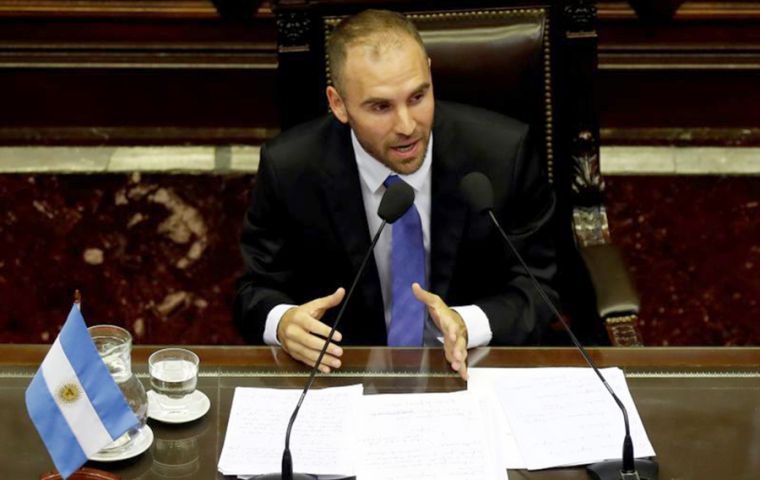MercoPress. South Atlantic News Agency
Argentina anticipates rough times for bondholders in any of three possible economic scenarios
 “It’s necessary to have a deep debt restructuring,” minister Guzman said at a congressional hearing
“It’s necessary to have a deep debt restructuring,” minister Guzman said at a congressional hearing Argentina’s economy minister confirmed bondholders’ worst fears, telling them to brace for significant losses as the country restructures its debt amid an economic crisis. Martin Guzman warned that holders of Argentine debt will probably be disappointed by the restructuring, without providing specifics on how steep losses could be.
“It’s necessary to have a deep debt restructuring,” he said at a congressional hearing where he provided his most detailed comments about debt strategy since taking office in December. “It’s clear that there’s going to be frustration on the part of bondholders.”
He later added: “We’re not going to allow foreign investment funds to set the guidelines on macroeconomic policy.”
Investors have been fearing an aggressive debt restructuring since August, when President Alberto Fernandez defeated pro-market leader Mauricio Macri in primary elections by a far wider margin than any poll had forecast. The peso and sovereign bonds prices have since plunged. Still the statement will come as a blow to those holding out hope that Fernandez would opt for a more moderate stance.
“There’s a lot of talk about whether the proposal to bondholders will be friendly or aggressive,” Guzman said. “Neither the proposal nor the focus are friendly or aggressive -- the focus is on sustainability.
Guzman’s comments set the tone for tense negotiations with bondholders, among them major investment funds such as BlackRock and Fidelity. He intends to provide a formal offer by the second week of March and finish talks by the end of that month, a timeline many economists say is very tight.
Guzman also made clear Argentina won’t continue on the austerity path set in the nation’s record US$56 billion bailout with the IMF, which calls for a primary fiscal surplus this year. He said the government won’t reduce its fiscal deficit in 2020 and laid out various scenarios where it would balance its budget over a much longer period of time.
Argentina’s economy is expected to contract for the third straight year in 2020 with inflation above 50%, high unemployment and a third of population living below the poverty line.
Although Guzman spoke positively about the IMF’s new leadership, he also said the institution was partly responsible for Argentina’s economic crisis. An IMF mission arrived in Buenos Aires on Wednesday for its first formal talks with the Fernandez administration.
Guzman, 37, provided some specifics investors have yearned to hear. He said Argentina’s bonds under New York laws will not be treated differently than bonds under local, Argentine law. It wouldn’t be prudent, he added, to provide fiscal forecasts five years or 10 years out while Argentina’s debt remains unsustainable.
Still, the minister posted three possible fiscal paths. In the first, Argentina has a primary fiscal balance by 2026. A second scenario, which he called more realistic, calls for a fiscal primary balance by 2023. A third, harder-to-achieve scenario forecasts a primary balance by 2022.
He also insisted that Argentina does have an economic plan, even though the government hasn’t spelled out any big-picture, medium-term planning since it took office two months ago. Lack of a public plan has left many analysts confused about Fernandez’s economic strategy.
“There’s a very defined economic program,” Guzman emphasized. “Behind absolutely every measure there’s a program. It’s all thought out.”




Top Comments
Disclaimer & comment rulesCommenting for this story is now closed.
If you have a Facebook account, become a fan and comment on our Facebook Page!